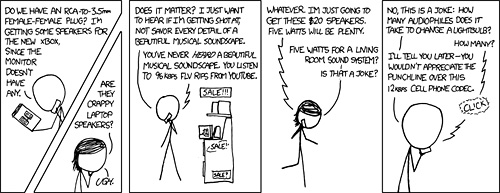First, this morning’s brilliant comment on our modern reality from xkcd (click through to the site for full version).
Which reminded me that I had been saving this article for post-holiday reading, an essay which teased “new devices that make downloaded music sound good.” For audiophiles who die a little every time they hear the term “mp3” (let alone the actual sound files) and for those of us who swear the difference is indistinguishable, Kaplan’s article is a nice review of the situation. In simple English, he outlines the fundamentals, down to his clear acknowledgment that how you listen (computer vs stereo, for example) is an important factor in determining how much impact file size and sampling rate have on your listening experience. But, as with most things, better technology comes along to correct problems and allows us to have it all.
On this New Year’s Eve Day, Chris Foley over at the Collaborative Piano blog shares this amazing Carol Burnett sketch. I don’t know about you, but I think I’ve been to this concert.
I have not, however, ever been to Germany. But if I ever get the chance, I hope to find myself there on a future Dec. 31, in a bar watching this bit of sketch comedy with the locals. In the meantime, Google brings the show to you.


Regarding the Burnett, I of course think of all those modernist, careerist composers from about 1950 to 1985 who controlled admittance to elite schools and festivals, and who controlled the prizes for young composers like the BMI Awards. Like good, academic herd animals, they only recognized music like that – though the Burnett group is perhaps a little better. The few dissenters were banished. I’d love to list the names of some of the main perpetrators of that musical chauvinism but I won’t. They were a joke then, and they still are. Most of the European scene is still dominated by music like that.
And in the USA, the same herd instinct is now represented by the postmodernists far more than we want to admit. We all have to spout the orthodoxy that pop music has the same artistic quality as classical. Madonna is equal to Mozart. Okey-dokey. I’ve been to those concerts too. Bleating sheep.
USB DACs aren’t really a very new idea, are they? They are just external sound cards. I’ve used one for the last 12 years, though very high end – a great RME Multiface. (32 channels including an ADAT light pipe, studio quality DACs, records 96 kHz 24 bit sound, etc.) I think many composers have long had them. The new idea is to make cheapy external sound cards for the consumer market.
Yes, “Dinner for One†is a New Years standard in Germany (part of their love for just about everything British,) but you won’t find TVs in many German bars. That’s an American thing. (I’ve lived as an expat in Germany for 30 years, but love watching American football in bars when home. The NFL is a genre of Ballet.)
Or maybe you could watch the Vienna Philharmonic on New Years, which now has 121 men and 3 women. They will be premiering their newly created outfits for the 3 women designed to make them look men so they won’t stick out. (I’m not kidding. Check it out.) The orchestra demonstrates how good music-making can still be deeply repugnant, with a good sound system or not.
Happy New Year.
Hmm…I’d recommend against taking Kaplan’s explanations very seriously. Much of it is just plain wrong, simplified well past the point of being correct.
For example, “compressed” audio is only compressed when it’s stored on the hard drive. When it’s being played by iTunes (or whatever program you’re using) the software expands the data back to something closer to it’s full resolution (ie bitrate). Yes, some information is lost (hence the ‘lossy’ label), but the algorithm works hard to make sure that it only loses information that people aren’t very sensitive to. So while there is a difference (one that many people can hear), claiming that the mp3’s bitrate is effectively one tenth of a CD’s is just wrong.
That’s only one example of the several misguided explanations he offers. These dedicated DACs may sound great, but not for the reasons he’s claiming.